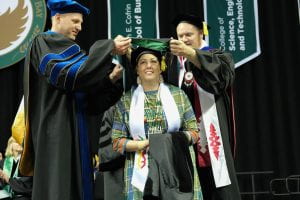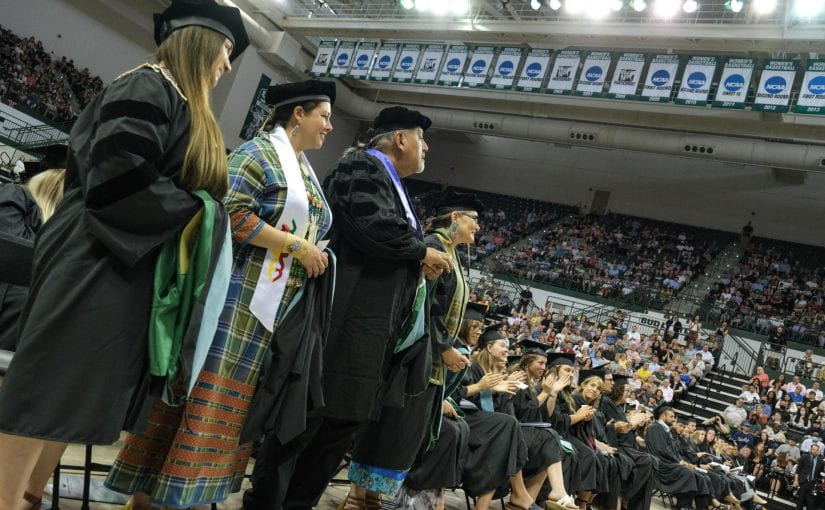History was made last May when Crystal Lepscier and her fellow students in the University of Wisconsin-Green Bay’s First Nations Education Doctorate Program crossed the commencement stage. The moment not only marked the first graduates of the program, but also the first-ever doctorates awarded by the University.
“Our classes were not always subjects you would normally find in a doctorate program,” says Lepscier, an enrolled member of the Little Shell Band of Chippewa of Montana who now works as the university’s First Nations Student Success coordinator. “We listened to oral stories, participated in classes on healing and generational trauma — it was all very inspiring,”

The First Nations Educational Doctoral Program was created to expand students’ knowledge about Indigenous peoples and prepare them to be changemakers. Led by program chair, Dr. Lisa Poupart, faculty created the program by meeting with tribes across Wisconsin to learn their needs and ask for feedback on their plans.
As part of the program, J P Leary, a UW-Green Bay associate professor and a member of program’s faculty, says students explore topics such as traditional (precontact) worldviews of the Indigenous peoples and their governance, the impact of Euro-American colonization and its resulting trauma, grant writing and the relationship between their work and Indigenous education. After two years of classes, students begin working on their applied dissertation project.
“The applied dissertation is something you do not find in traditional PhD programs,” says Leary (Cherokee/Delaware). “Students take what they’ve researched and apply it to the community. The practice of that research has an inter-generational aspect as well. They need to involve elders or youth in what they are doing.”

The First Nations Educational Doctoral Program is one of the initiatives included in the $20 million Ignite the Future campaign. Last fall, Delaware North, a global hospitality company that operates the food service at Lambeau Field, announced a $100,000 donation over five years to support its First Nations programs.
“The First Nations programs are of significant importance in developing leaders who are resilient, inclusive and engaged members of the community – ready to face challenges and solve problems,” Jamie Obletz, president of Delaware North Sportservice, said when the donation was announced.
Last fall, the program’s third cohort of students began. As part of the year-round program, students meet at the university every third weekend, taking two classes at a time. After that, students begin to work on their dissertation, which may take another two or three years, says Leary, adding that some members of the first cohort are still finishing their dissertation and application of learning and that members of the 2020 cohort have started on their dissertations.

“These are all working adults in the program and through the cohort, they develop a bond,” he says.
Lepscier agrees. “We became close and there are things you need to give up to be in the program, but you need to remember what brought you there — your own motivation your ancestors and knowing you are doing something to help your community,” she says.


